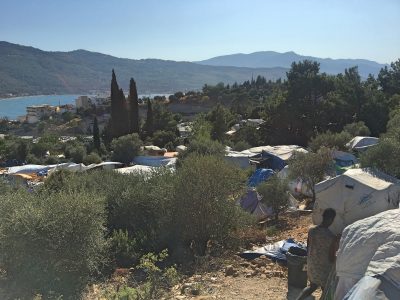Shameful Treatment of Refugees on Greek Island: A Snapshot
fleeing war, torture and rape—mostly in Syria, Afghanistan and Iraq—and making their way to Europe.

On Sunday, October 11, Mohammad was lying on the road, holding his foot and screaming in pain. “You treat us worse than dogs!” he shouted at the hospital. A twenty-year-old refugee from the province of Homs in Syria he, like so many of his countrymen, had fled the war in an attempt to build a life in Europe. He arrived on the Greek island of Samos, where he has been living for the last thirteen months.
***
Mohammad is one of over 2.5 million refugees who since 2015 have been fleeing war, torture and rape—mostly in Syria, Afghanistan and Iraq—and making their way to Europe. Many of them used Samos, Lesbos and several other Aegean islands as the gateway, making the short but dangerous crossing from Turkey in ramshackle boats. Initially they were permitted to continue to the Greek mainland and eventually on to Western Europe. However, the 2016 agreement between Turkey and the European Union forced asylum seekers to remain on the islands, turning them into virtual prisons. There they would stay—some of them for years—in abhorrent conditions, living in overcrowded, filthy camps that have been compared to concentration camps.
In the Samos camp, the conditions lead to serious health concerns.
“There are many hygiene-related diseases, such as scabies, lice, bedbugs and skin infections. I also see a lot of patients with mental health issues. They come here having experienced trauma at home, and then the camp conditions exacerbate their difficulties. I see a great deal of depression, anxiety, panic attacks and suicidal ideation,” said Dr. Andre Simpson, a doctor who works on Samos.
Despite the health problems, access to medical care is extremely limited. The single doctor in the camp—responsible for all 4,500 asylum seekers— is so overwhelmed that refugees often spend the night in front of his office in hopes of being seen the following day. For emergencies or to see a specialist they must go the local hospital.
Mohammad had not come from Syria alone. He brought with him two screws that surgeons had inserted into his right foot to repair a gaping hole left by several bullets.
“It looks like they opened up the foot and just stuffed all the bones in there that a foot should have,” said Dr. Simpson, who saw Mohammad’s X-rays on Samos. “It will need to be amputated.”
When Mohammad arrived on Samos, he immediately informed the camp authorities about his foot, but it wasn’t until eleven months later that he was finally able to see a doctor. (At the time, the hospital’s official policy mandated that only one refugee could be seen for every six non-refugees, creating enormous backlogs.)
The pain he had been enduring since the operation became excruciating when he slipped and fell in the camp the previous day. Four of his friends carried him down the steep incline from his tent (there is no stretcher in the camp) to the road, where a policeman agreed to call an ambulance to take him to the local hospital.
Mohammad speaks no English and asked me to translate for him at the hospital, but I was refused entry by the guard. I wondered how the doctors could possibly treat him without being able to communicate with him.
As I waited outside, a Syrian couple arrived. The woman was about to give birth, but the guard told her roughly to wait. She sat down in the street, in obvious pain. Eventually she was allowed to enter, but her husband would have to miss the birth of his child.
After two hours Mohammad emerged from the hospital, carried by his friend.
“They didn’t even look at my foot,” he seethed. “They gave me an injection and a prescription for painkillers. ‘Go! Go!’ they yelled at me. “I can’t take the pain anymore! I’m going to cut my foot off!”
Earlier in the day Mohammad had taken five times the maximum dose of the painkiller diclofenac. The injection in the hospital turned out to be the same drug.
“What they did was highly irresponsible,” said Dr. Simpson. “It is malpractice. The injection could have caused life-threatening kidney failure. All because they didn’t bother trying to talk to him.”
According to Greek law, the Samos hospital’s emergency room cannot turn patients away, but stories abound of it doing precisely the opposite.
“It happens all the time,” said Francois, a young Cameroonian refugee. “They just shout at us and wave us away.” The consequences of this behavior became tragic in June, when a young Ghanaian man died a few hours after being refused entry, complaining of severe headaches.
Many refugees come to Europe because of its reputation as a place where human rights are respected. They are shocked at the treatment they receive, both by the authorities and local residents.
“Nobody cares about our rights here,” Mohammad said. “I was better off in Syria.”
Some of my friends arrived and offered to give him a ride back to the camp. It felt like an absurd gesture, in the face of what had just happened at the hospital and all that he had experienced on Samos, and I was not surprised when he refused. He cursed and limped off slowly in the direction of the camp.
*
Note to readers: please click the share buttons above or below. Forward this article to your email lists. Crosspost on your blog site, internet forums. etc.
Prof. Richard Hardigan is a university professor in the United States, whose work has appeared in Al Jazeera, Huffington Post, and other websites. My book, The Other Side of the Wall: An Eyewitness Account of the Occupation in Palestine, was published by Cune Press. My website is richardhardigan.com.
Featured image is from the author

